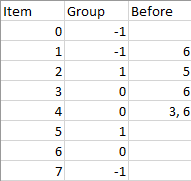2021-07-16 Daily-Challenge
Today I have done Sort Items by Groups Respecting Dependencies and leetcode's July LeetCoding Challenge with cpp.
Sort Items by Groups Respecting Dependencies
Description
There are n items each belonging to zero or one of m groups where group[i] is the group that the i-th item belongs to and it's equal to -1 if the i-th item belongs to no group. The items and the groups are zero indexed. A group can have no item belonging to it.
Return a sorted list of the items such that:
- The items that belong to the same group are next to each other in the sorted list.
- There are some relations between these items where
beforeItems[i]is a list containing all the items that should come before thei-th item in the sorted array (to the left of thei-th item).
Return any solution if there is more than one solution and return an empty list if there is no solution.
Example 1:

Input: n = 8, m = 2, group = [-1,-1,1,0,0,1,0,-1], beforeItems = [[],[6],[5],[6],[3,6],[],[],[]]
Output: [6,3,4,1,5,2,0,7]
Example 2:
Input: n = 8, m = 2, group = [-1,-1,1,0,0,1,0,-1], beforeItems = [[],[6],[5],[6],[3],[],[4],[]]
Output: []
Explanation: This is the same as example 1 except that 4 needs to be before 6 in the sorted list.
Constraints:
1 <= m <= n <= 3 * 10^4group.length == beforeItems.length == n-1 <= group[i] <= m - 10 <= beforeItems[i].length <= n - 10 <= beforeItems[i][j] <= n - 1i != beforeItems[i][j]beforeItems[i]does not contain duplicates elements.
Solution
amazing double topological sort
class Solution {
int groupDegree[30000] = {};
int degree[30000] = {};
vector<int> children[30000];
vector<int> groupChildren[30000];
vector<int> items[30000];
public:
vector<int> sortItems(int n, int m, vector<int>& group, vector<vector<int>>& beforeItems) {
// init
for(int i = 0; i < n; ++i) {
if(group[i] == -1) group[i] = m++;
items[group[i]].push_back(i);
}
for(int i = 0; i < n; ++i) {
for(auto p : beforeItems[i]) {
children[p].push_back(i);
degree[i] += 1;
if(group[p] != group[i]) {
groupDegree[group[i]] += 1;
groupChildren[group[p]].push_back(group[i]);
}
}
}
// topological sort for group
vector<int> groupOrder;
queue<int> q;
for(int i = 0; i < m; ++i) {
if(!groupDegree[i]) q.push(i);
}
while(q.size()) {
int cur = q.front();
q.pop();
groupOrder.push_back(cur);
for(auto c : groupChildren[cur]) {
groupDegree[c] -= 1;
if(!groupDegree[c]) q.push(c);
}
}
// cout << groupOrder << endl;
if(groupOrder.size() != m) return {};
// sort items
vector<int> answer;
for(auto g : groupOrder) {
int sz = answer.size();
for(auto item : items[g]) {
if(!degree[item]) q.push(item);
}
while(q.size()) {
int cur = q.front();
q.pop();
answer.push_back(cur);
for(auto c : children[cur]) {
degree[c] -= 1;
if(group[c] == group[cur] && !degree[c]) {
q.push(c);
}
}
}
if(answer.size() - sz != items[g].size()) return {};
}
return answer;
}
};
// Accepted
// 17/17 cases passed (112 ms)
// Your runtime beats 65.23 % of cpp submissions
// Your memory usage beats 83.77 % of cpp submissions (41.5 MB)
July LeetCoding Challenge 16
Description
4Sum
Given an array nums of n integers, return an array of all the unique quadruplets [nums[a], nums[b], nums[c], nums[d]] such that:
0 <= a, b, c, d < na,b,c, anddare distinct.nums[a] + nums[b] + nums[c] + nums[d] == target
You may return the answer in any order.
Example 1:
Input: nums = [1,0,-1,0,-2,2], target = 0
Output: [[-2,-1,1,2],[-2,0,0,2],[-1,0,0,1]]
Example 2:
Input: nums = [2,2,2,2,2], target = 8
Output: [[2,2,2,2]]
Constraints:
1 <= nums.length <= 200-109 <= nums[i] <= 109-109 <= target <= 109
Solution
auto speedup = [](){
cin.tie(nullptr);
cout.tie(nullptr);
ios::sync_with_stdio(false);
return 0;
}();
class Solution {
int len;
void solve(
vector<vector<int>> &answer,
vector<int> &cur,
vector<int> &nums,
int index,
int rest,
int count
) {
// cout << rest << " " << index << " " << count << endl;
if(!count) {
if(!rest) answer.push_back(cur);
return;
}
if(nums.back() * count < rest) return;
int prev = INT_MIN;
while(index < len) {
index = upper_bound(nums.begin() + index, nums.end(), prev) - nums.begin();
if(index >= len) return;
prev = nums[index];
if(prev * count <= rest) {
cur.push_back(prev);
solve(answer, cur, nums, index + 1, rest - prev, count - 1);
cur.pop_back();
}
}
}
public:
vector<vector<int>> fourSum(vector<int>& nums, int target) {
vector<vector<int>> answer;
vector<int> tmp;
sort(nums.begin(), nums.end());
len = nums.size();
solve(answer, tmp, nums, 0, target, 4);
return answer;
}
};
// Accepted
// 283/283 cases passed (288 ms)
// Your runtime beats 6.98 % of cpp submissions
// Your memory usage beats 45.62 % of cpp submissions (13.1 MB)